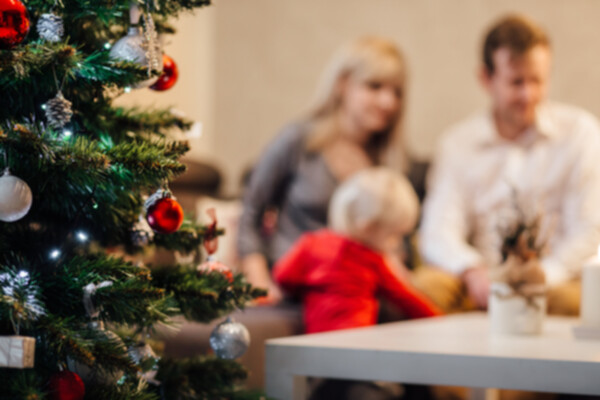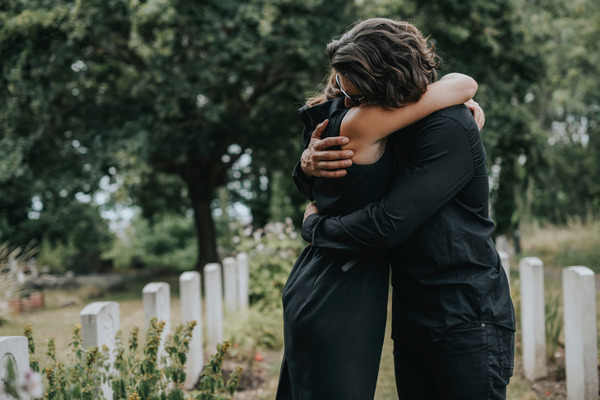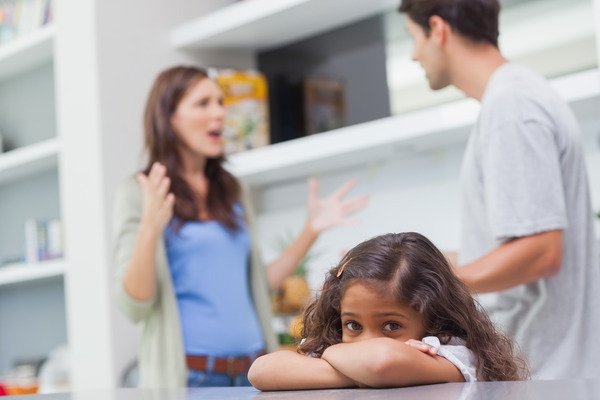Why are there many conflicts at Christmas? How can we deal with family conflicts at Christmas? Find out how we can deal with these family crises during this time of year.

Although Christmas is usually a time in which most people tend to have positive feelings, the reality is that there is a part of the population that fears these moments of the year. The reason is behind a bad relationship with other family members. In this way, in some cases, the family conflicts at Christmas They become a real nightmare.
The two faces of Christmas
On the one hand, Christmas is a time for vacation, for sharing happy moments with loved ones, with family, with friends, it is time for Christmas lights, excitement, gifts, celebrations. They are such special dates that in many families different generations can come together: From children, parents, grandparents, great-grandparents, grandchildren, great-grandchildren, so it is a source of experience and coexistence, of unforgettable moments, of teaching and of positive values. There are two family sectors that especially need to feel love and be supported by the family and they are children and the elderly at Christmas.
On the other hand, Christmas too it’s stress, stress from shopping, rushing, the stress of preparing meals, dinners, many discussions, doubts, friction or worries arise. Questions like:
- Who is in charge of the gifts, the food?
- Who does the eating?
- Who decorates the house? Who puts up the nativity scene, the Christmas tree?
- On what dates do we go to the in-laws’ house?
- On what dates do you go to your parents’ house?
- Who do we invite to our house?
- Who takes care of the children?
Doubts, conflicts, disagreements arise. In Christmas all the feelings They intensify, they are dates of excessive expenses that cause worries, of high expectations that may not be met, of anxiety towards certain family members with whom you usually have friction or conflicts but who you have to see on these dates, at family gatherings.

What do we understand by family conflicts at Christmas?
It depends on how you approach it, you can see it from one point of view or another. No family is perfect. Disagreements, conflicts, problems arise in all families, it is something natural and part of life. Now, there are two ways to perceive the conflict. Conflict can be seen as an opportunity for change, as something positive to improve, as an experience to learn, reach agreements, get to know yourself better and get to know others better. Or you can see conflict as a power relationship in which some win and others lose, if you see it as a power relationship, in reality everyone loses, since it damages relationships and arises, generates resentment, rejection, family discomfort
What to do when family conflicts arise at Christmas?
The first thing is to prevent, prevent extra expenses that Christmas generates and are reasons for discussions, it is important not to go over budget. Anticipate purchases and gifts in advance, do not leave them until the last minute because it creates a lot of stress. Negotiate the different tasks, expenses, activities and reach agreements, do not place responsibilities on a single person, share responsibilities.
Have an open, positive attitude, be aware that these are dates of coexistence of different generations, of sharing good moments, of not get into family arguments it is not the time, it is not the place, we must prevent and act as a barrier when there is a source of conflict, diverting attention to neutral topics, doing activities, family games.
Not having one high expectations that at Christmas all problems are solved, like in the movies or magical Christmas stories, if you have had a problem with a family member throughout the year, do not expect to solve it at Christmas, the opposite can happen. Have open, positive communication, do not judge others without knowing their intentions, it is important to know how to listen, it is not about listening and not paying attention, but rather listening to the feelings, needs, interests of others, without judging them, It’s about active listening and not interrupting.
Be nice. The empathy It consists of putting ourselves in the place of others, respecting their way of thinking, feeling and acting, it is the basis of emotional intelligence. It is not a question of being right, in conflicts we all want to be right, we have to understand that each one has a perception of reality, so no one is in possession of the absolute truth.
It is important to learn to see others with different eyes in their entirety, as they really are, with their lights and shadows, no one is perfect, it is important not to put labels, people are not good or bad, but rather they behave in different ways. appropriate or inappropriate way Therefore you have to learn to see the light in others, the positive side.
How to avoid family conflicts at Christmas?
There are a series of tips that we can follow to put aside family conflicts at Christmas. According to psychologists, it is essential to follow the following guidelines in the event of a family fight during these times.
- Keep your distance: At family gatherings keep certain distances With those family members with whom you may have some friction, old quarrels, unresolved conflicts, it is better not to have them in front of or nearby, look for another strategic place where you can sit and share with family members with whom you have more affinity.

- Do not get into harmful topics: Do not get involved in issues that are especially hot, do not engage in provocations, do not counter attacks, this is not the time or the place. There are topics that can cause tension or irritability at the table, so change the conversation, stay calm, leave the room for a moment if you notice that you are getting tense and breathe deeply, think that it is not worth getting into controversies that do not you’re going to solve it.
- Watch out for jokes: Be careful with jokes double intention that are loaded with poison, hints, gossip, rumors, all of this generates discomfort. Be careful with alcohol, alcohol is a disinhibitor and can warm your mouth, if the atmosphere is hot, relax, keep your distance, do it for the most sensitive people at Christmas, children and the elderly, they need to live Christmas in harmony , in peace, with joy.
- Set limits: Don’t tolerate disrespect, insults, but not against attacks. If you see that the situation is getting heated, that there is a lot of tension, shorten your stay at the family reunion. If you are at home, look for neutral conversation topics, tell a joke, a funny anecdote, that relaxes the atmosphere, play music, suggest dancing, propose a family game in which the majority can participate, redirect the situation, divert attention .

There are families that are more prone to conflict
Yes effectively. We have to understand that the family is the first social system in which a person is born, will condition your socialization, your belief system, your self-esteem, your values, the structure of your personality, which may be a more solid structure or less, depending on whether you are born or live within a family. functional or within a dysfunctional family. The dysfunctional family is more prone to conflicts since it lacks the appropriate tools to manage emotions and conflicts.
How is a functional family different from a dysfunctional family? What are the keys? We start from the basis that no family is perfect, therefore in all families there are conflicts The big difference between a functional family and a dysfunctional one is that in the functional family you learn to manage emotions and conflicts in a healthy and effective way, tools and resources are taught, and communication is valued and practiced. emotional intelligence
The functional family It is an open, flexible, permeable family system, the needs, interests, and feelings of family members are respected, the evolutionary development of personality is encouraged, it generates a solid and healthy structure of the person, it facilitates and promotes self-esteem, Family members feel that the family provides them with security, stability, unconditional love, respect, each person’s capacity, creativity, and the feeling of family unity are encouraged. It is an imperfect but healthy family that generates healthy children.
The dysfunctional family On the contrary, it is a family with a structure that is either very rigid and impermeable or the limits are very imprecise and variable. The dysfunctional family is not healthy, it does not allow the personal growth of its members, it suffocates the individual development of each family member.
Each family member takes on a specific role, a paper and it is fixed in the family system: The dysfunctional family presents a certain script in which either you follow and stick to the script or you are not part of the system, they reject you and make you the target of conflicts and family discomfort, this is what in psychology is called the scapegoat or scapegoat. The dysfunctional family does not encourage responsibility, defense mechanisms of denial and projection type are used. I don’t have the problem, you have the problem! It presents a very rigid, very absolute black and white belief system: Either I am perfect or I am imperfect, or I am a winner or I am a failure, or I am good or I am bad.
What encourages irrational families?
- Fear of being wrong: By having such a rigid belief system, mistakes are not allowed, whoever makes a mistake loses status, they are a failure.
- Fear of loneliness, abandonment: If you do not follow the family script, you are excluded, that generates a lot of insecurity, a lot of instability, it is a conditional love in which you need family approval before your own acceptance.
- Fear of expressing true emotions: true feelings, your needs, your interests for fear of rejection. What you feel or want does not matter, your happiness, your well-being does not count.
- They use social mediators: For this reason, in many dysfunctional families, mood alterers are used, such as alcohol, drugs, activities such as gambling, compulsive shopping, any substance or activity that can end up being addictive, but that the dysfunctional family covers up because it is lives on appearance.
- Rivalry is generated between family members: There is a toxic environment, where empathy is not encouraged, but rather jealousy, envy, underhanded criticism, gossip, there is no true responsible communication, so conflicts are not resolved.
- The dysfunctional family generates dependent, insecure, unstable children: Psychology consultations are full at Christmas with victims of dysfunctional families.
Tips to survive family conflicts at Christmas
One has to learn to be happy, it is our right and our need. Regardless of your family, you decide how to live these holidays. You can’t change anyone around you, but you can decide to change yourself.
Give yourself permission to live a happy holiday and remember: yes you change and you decide to be happy, those around you will position themselves and if someone moves away, it has to be that way. The important thing is to surround yourself with people who love you, who contribute to you, who make you feel good and do the same with the people around you.
You decide, the script of your life You do it and decide to have a happy Christmas. You decide to form your own functional family, calculating values of respect and unconditional love, with clear, flexible and healthy rules and limits.
If your family hurts you, stay away, now is not the time, choose to spend Christmas calmly, with well-being, surrounded by people who love you in a healthy way. I invite you to live Christmas from your eyes and








